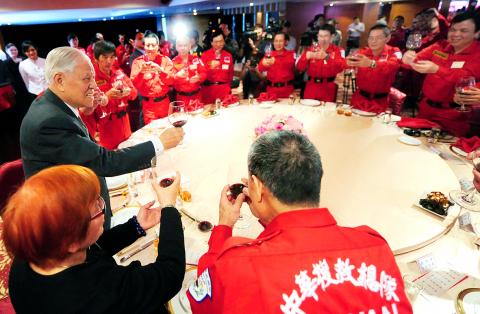|
Lee slams MOFA for
obstructing Japan relief effort
GO, DON’T GO: A private search-and-rescue
team had asked for MOFA’s help to take part in relief efforts in Japan, only to
be told that this was ‘inappropriate’
By Ko Shu-ling / Staff Reporter

Former president Lee Teng-hui, standing left,
toasts Taiwanese search-and-rescue team members at a banquet in Taipei yesterday
to congratulate them on their work in Sendai City and Iwate Prefecture following
the earthquake and tsunami that struck Japan’s northeastern coast on March 11.
Photo: CNA
Former president Lee Teng-hui (李登輝)
yesterday accused the Ministry of Foreign Affairs (MOFA) of preventing a private
search-and-rescue team from going to Japan following the devastating earthquake
and tsunami, adding that Tokyo had caved in to pressure from Beijing in
rejecting the team’s request to participate in rescue operations.
Addressing International Headquarters Search and Rescue, Taiwan, Lee said the
group had asked for assistance from the ministry to participate in Japan’s
relief efforts after the disaster on March 11.
However, the ministry told them to stay put and asked China Airlines (中華航空) to
withhold issuing plane tickets for the group, Lee said.
“The first 72 hours are the most critical and we were racing against time,” he
said. “I was very worried when I heard the responses from the foreign ministry
and Interchange Association, Japan, [Japan’s representative office in Taiwan in
the absence of official diplomatic ties].”
Lee said the rescue team thought that rather than wait in Taiwan, they should do
so in Tokyo. After they contacted EVA Air (長榮航空), the airline agreed to
transport the 35 members to Japan on March 13. However, the Japanese government
did not allow the team to join the rescue operation until March 15, he said.
Lee made the remarks while hosting a lunch for the team members, who returned on
March 18. They were the first international rescue team to arrive and the last
to leave after the discovery of radiation leaks.
Lee said the team was formed in 1999 during his presidency after the devastating
921 Earthquake. A Japanese consortium had donated ¥300 million (US$3.57 million)
and allocated ¥100 million for the purchase or upgrading of equipment for the
team.
Lee blamed Tokyo’s delay in giving permission on Beijing, saying its actions
hampered rescue efforts.
“Humanitarian assistance must not have any political consideration,” he said.
“It cannot be judged by ideology, or people will suffer.”
Lee said the Chinese rescue team, which arrived the day after the Taiwanese
team, also made a fuss after seeing the Republic of China (ROC) flag on the
latter, and said it was the flag of the “Taiwan area.”
Team commander Lu Cheng-tsung (呂正宗) said that while international rescue teams
were thankful for his team’s help, the Chinese team was hostile to it. Lu said
the 15-member Chinese team, consisting mostly of government officials, told
Taiwan’s national rescue team to return to Taiwan.
Lee said he telephoned the team captain every night to offer encouragement,
knowing they worked under dire circumstances as there was no water, gas or
electricity in temperatures below 0°C.
Wang Mei-chu (王美珠), chairperson of International Headquarters Search and Rescue,
Taiwan, said Lee thought Taiwan needed a private search-and-rescue team so the
country could repay the international community for its help when Taiwan was in
trouble.
She said the ministry had told them that it was “inappropriate” for her team to
go because the administration would send a national team there.
“I told the foreign ministry that there are certain things the national team
cannot do, such as flying the national flag, but we can as a private group,” she
said. “The administration should make good use of the private sector.”
Lu recounted how one of the Chinese rescue team members pointed to the ROC flag
on his uniform and said it was the flag of the “Taiwan area.”
“I told him firmly that it is the flag of the ROC,” Lu said.
The former president attributed the Chinese team’s behavior to President Ma
Ying-jeou (馬英九), saying it had “a lot to do with [Ma’s] view that Taiwan is an
‘area,’” rather than a country.
While Ma has been busy taking pride in easing cross-strait tensions, Beijing’s
oppression and obstructionism has never abated, and Taiwan must be cautious of
China’s political ambitions, Lee said.
|
![]()
![]()
![]()